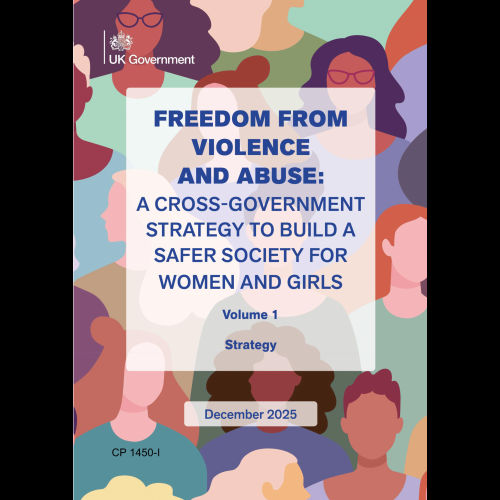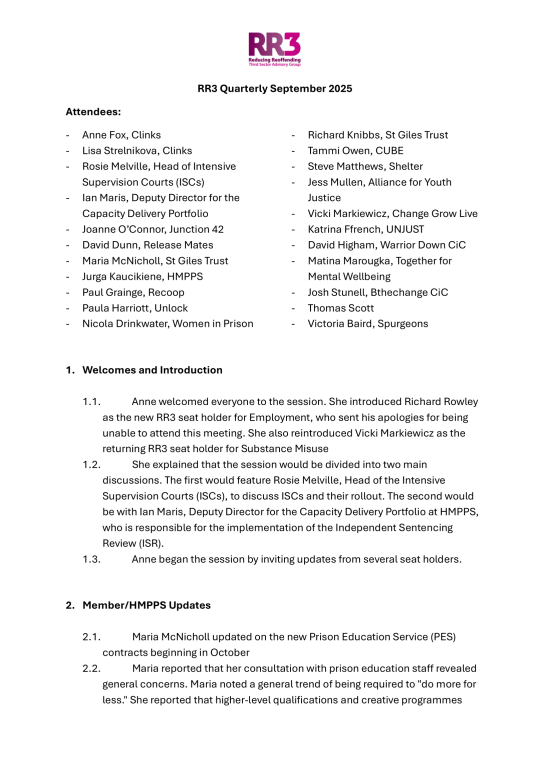Update - 11 June 2025: Changes to recall come into effect
The Government laid a statutory instrument in Parliament, on 9 June 2025, that amends the Criminal Justice Act 2003 in order to make a change to recall policy. This change mandates fixed-term recalls for people serving standard determinate sentences of less than four years. Those eligible will therefore only be recalled for a fixed period of 28 days and then automatically released.
Ministry of Justice announcement
The Ministry of Justice has announced a change to current recall policy, as a measure to relieve pressure on prison overcrowding. The Government has announced that legislation will be brought forward, shortly, that will enable the greater use of Fixed-Term Recalls. Implementation will be phased from early September to early November for those already currently in prison on recall.
The changes
- People with a sentence of between 12 and under 48 months, who are recalled, will be subject to a Fixed-Term Recall of 28 days and cannot be subjected to a standard recall
- This replaces the current process whereby people serving a sentence between 12 and under 48 months could be subjected to a Standard Recall, with subsequent release to be determined by a review and approval by the Parole Board, or by officials acting on behalf of the Justice Secretary
- There will be eligibility criteria to ensure that certain people will be excluded from these new measures. Those who this will not apply to:
- Are under 18 years old at the point of recall
- Are managed on multi-agency management plans (MAPPA levels 2 and 3)
- Have been charged with a serious further offence (defined as murder and any offence listed in Schedule 18 of the Sentencing Act 2020)
- Have committed a serious offence while out of prison on license
- Are convicted of national security or counter terrorism crime
- The measure will be applied to people already in custody on a recall, if they are in scope
- Those excluded will be considered for a Fixed-Term or Standard Recall, as is currently the case.
The context
The significant increase in the number of recalls has been a key driver of the ongoing prison capacity crisis. Between 2010 and 2023, there was a 78% increase in the number of license recalls, equating to 12,000 more license recalls in 2023 than in 2010.[1] Today’s announcement won’t necessarily reduce these numbers. Instead, the new measure will ensure that – for a significant cohort of people – re-releases will happen more quickly, given that Fixed-Term Recalls of 28 days will be utilised to a greater extent. This will lead to a reduction in the number of Standard Recalls, for those eligible, which should ensure that there will be fewer people spending more than 28 days in custody following their recall to prison. This should have some impact on prison overcrowding, with the Government stating the change will free up 1,400 prison spaces.
What this measure won’t change is the seriously detrimental impact that recalling a person to prison has on their rehabilitation. This is because being recalled means starting again, with issues related to things like housing and employment, when someone is recalled and then re-released.
We hear from many voluntary sector organisations working with people in the community that many of these recalls can be avoidable and are often used as a risk avoidance measure as opposed to in cases of further offenses. Recent data illustrates that 72% of recalls were for non-compliance, compared with only 28% relating to new or suspected offences.[2] While this approach is understandable and positive in many aspects, the focus must be on preventing recalls in the first instance and in supporting probation to most effectively manage people in the community, without reverting to the over-use of recall.
We have HMPPS’ commitment to work with the sector on understanding the impact and preparing for the impact that this measure will have on resettlement support.
See the Government's announcement here
[1] Offender Management statistics quarterly: October to December 2023 and annual 2023, Ministry of Justice, 2024
[2] Offender Management Statistics quarterly: October to December 2024 and annual 2023
What's new
Blogs
Violence Against Women and Girls (VAWG) Strategy Blog
Publications
Latest on X
The role is for a leader from an organisation focused on racially minoritised people, with expertise in service delivery, policy, advocacy, or related areas in criminal justice. Racial disparities are present at every CJS stage. This role ensures these voices are central in shaping policy to help address and eradicate them. Apply by Mon 18 Nov, 10am. More info: https://www.clinks.org/voluntary-community-sector/vacancies/15566 #CriminalJustice #RR3 #RacialEquity

